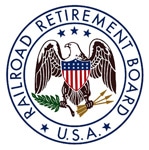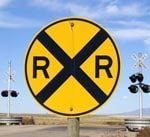 Persons claiming retirement, disability, survivor, unemployment or sickness benefits from the Railroad Retirement Board (RRB) have the right to appeal unfavorable determinations on their claims. The following questions and answers describe the appeals process for persons whose claims under the Railroad Retirement Act or Railroad Unemployment Insurance Act are denied, or who are dissatisfied with decisions on their claims.
Persons claiming retirement, disability, survivor, unemployment or sickness benefits from the Railroad Retirement Board (RRB) have the right to appeal unfavorable determinations on their claims. The following questions and answers describe the appeals process for persons whose claims under the Railroad Retirement Act or Railroad Unemployment Insurance Act are denied, or who are dissatisfied with decisions on their claims.
1. How does a person initiate a review of an unfavorable decision on a claim and what are the time limits?
For all claims under the Railroad Retirement and Railroad Unemployment Insurance Acts there is a three-stage review and appeals process within the RRB.
An individual dissatisfied with the initial decision on his or her claim may first request reconsideration from the RRB unit which issued that decision. An individual has 60 days from the date on which notice of the initial decision is mailed to the claimant to file a written request for reconsideration. This step is mandatory before an appeal may be filed with the RRB’s Bureau of Hearings and Appeals.
In cases involving overpayments, an individual has the right to request waiver of recovery and also a personal conference. In order for recovery of the overpayment to be deferred while a waiver request is pending, the waiver request must be in writing and filed within 60 days from the date on which notice of the overpayment was mailed to the beneficiary. A request for waiver received after 60 days will be considered but will not defer collection of the overpayment, and any amount of the overpayment recovered prior to the date on which the waiver request is filed will not be subject to waiver.
2. What are the second and third stages of the appeals process and their time limits?
If dissatisfied with the reconsideration or waiver decision on a retirement, disability, survivor, unemployment or sickness claim, a person may appeal to the RRB’s Bureau of Hearings and Appeals, which is independent of those units responsible for initial and reconsideration decisions. An appellant has 60 days from the date on which notice of the reconsideration or waiver decision notice is mailed to the claimant to file this appeal. This appeal must be filed using RRB Form HA-1, which may be obtained from the RRB’s field offices or the agency’s website, www.rrb.gov. The Bureau of Hearings and Appeals may, if necessary, further investigate the case and obtain reports through the RRB’s field representatives, designated medical examiners, and others who may be in a position to furnish information pertinent to the appellant’s claim. If the appeal involves questions of fact, the appellant has the right to an oral hearing before a hearings officer. In cases where an in-person hearing is held, it may be conducted in the RRB office closest to the appellant’s home. In some cases, video conferencing or phone hearings are held.
If not satisfied with the Bureau of Hearings and Appeals’ decision, an appellant may further appeal to the three-member Board, which heads the agency, within 60 days from the date on which notice of the Bureau of Hearings and Appeals’ decision is mailed to the appellant. The three-member Board ordinarily will not accept additional evidence or conduct a hearing.
3. What are the criteria applied to requests for waivers of retirement, disability, or survivor benefit overpayments, and unemployment or sickness benefit overpayments?
A person’s obligation to repay any erroneous benefit payments may be waived only if the following conditions are met:
(1) The person was not at fault in causing the overpayment; and (2) recovery of the overpayment would cause financial hardship to the extent that he or she would not be able to meet ordinary and necessary living expenses, or recovery would be against equity or good conscience. “Against equity or good conscience” is defined in the regulations of the RRB as meaning that the claimant has, by reliance on the payments made to him or her, or on notice that payment would be made, relinquished a significant and valuable right or changed his or her position to his or her substantial detriment.
In cases involving unemployment or sickness benefits, there is an additional requirement that the overpayment must be more than 10 times the current maximum daily benefit rate.
Persons requesting waiver may be asked to complete a financial statement on a form provided by the RRB.
4. What happens if a person’s appeal is not filed within the prescribed time limit?
Failure to request reconsideration or to file an appeal within the allocated time period will result in forfeiture of further appeal rights, unless there is good cause for the delay. Some examples of good cause include: serious illness; a death or serious illness in the appellant’s immediate family; destruction of important or relevant records; failure to be notified of a decision; an unusual or unavoidable circumstance which demonstrated that the appellant could not have known of the need for timely filing or which prevented the appellant from filing in a timely manner; or the claimant thought that his or her representative had requested reconsideration or appeal. If good cause is not established, further appeal is forfeited, except that the appellant may contest the determination that the request for reconsideration or appeal was not filed timely.
5. Are there avenues of appeal beyond the RRB?
Appellants dissatisfied with the three-member Board’s final decision may then file a petition with the appropriate U.S. Court of Appeals to review the Board’s decision. In cases involving retirement, disability or survivor claims, the petition for review must be filed within one year after notice of the three-member Board’s decision has been mailed to the appellant. In cases involving claims for unemployment or sickness benefits, the petition for review must be filed within 90 days of the Board’s decision notice.
6. Can employers contest the claims of their employees for unemployment and sickness benefits?
When an employer is a party to the claim for benefits, that employer may protest the payment of benefits, but such protests do not prevent the timely payment of benefits. However, an employee may be required to repay benefits if his or her employer’s protest is ultimately successful. The employer also has the right to appeal an unfavorable decision to the RRB’s Bureau of Hearings and Appeals.
7. Where can a person obtain retirement, disability, survivor, unemployment or sickness benefit appeals forms and assistance in completing the forms?
Requests for reconsideration of an initial decision must be in writing, but do not have to be on any specific form. The appropriate form for waiver of recovery of a benefit overpayment is ordinarily enclosed with the overpayment notice. As stated earlier, RRB Form HA-1, which must be used to appeal to the Bureau of Hearings and Appeals and the three-member Board, is available from the RRB’s Bureau of Hearings and Appeals, 844 North Rush Street, Chicago, Illinois 60611-2092, or online at www.rrb.gov. This form can also be obtained from any RRB field office, as can assistance in filing a request for review at each of the administrative levels.
Persons wishing to contact an RRB field office can call the RRB’s toll-free phone number at 1-877-772-5772. Claimants can also find the address of the RRB office serving their area by calling this toll-free number. Most RRB offices are open to the public from 9:00 a.m. to 3:30 p.m., Monday through Friday
, except on Federal holidays. Field office locations can also be found by visiting www.rrb.gov.
 BILLINGS, Mont. — U.S. railroads forced to turn over details of their volatile crude oil shipments are asking states to sign agreements not to disclose the information. But some states are refusing, saying Thursday that the information shouldn’t be kept from the public.
BILLINGS, Mont. — U.S. railroads forced to turn over details of their volatile crude oil shipments are asking states to sign agreements not to disclose the information. But some states are refusing, saying Thursday that the information shouldn’t be kept from the public.


 Nearly 99 percent of Brotherhood of Locomotive Engineers and Trainmen (BLET) members working for the Southeastern Pennsylvania Transportation Authority (SEPTA) have voted to authorize a strike when a mandatory 30-day cooling off period under the Railway Labor Act ends in less than two weeks, BLET officials announced this morning.
Nearly 99 percent of Brotherhood of Locomotive Engineers and Trainmen (BLET) members working for the Southeastern Pennsylvania Transportation Authority (SEPTA) have voted to authorize a strike when a mandatory 30-day cooling off period under the Railway Labor Act ends in less than two weeks, BLET officials announced this morning. WASHINGTON – The Association of American Railroads (AAR) June 3 announced that North America’s freight railroads will host events in multiple cities across the country in observance of the sixth-annual International Level Crossing Day (ILCAD) aimed at raising public awareness about safe behavior around railroad grade crossings.
WASHINGTON – The Association of American Railroads (AAR) June 3 announced that North America’s freight railroads will host events in multiple cities across the country in observance of the sixth-annual International Level Crossing Day (ILCAD) aimed at raising public awareness about safe behavior around railroad grade crossings.